January 2024
Meeting of the Social Innovation Council
The main topic of the end-of-January meeting of the professional advisory board established as part of the 4IM project was the results of the research conducted as part of the program. The experiences were presented by the research leader representing the University of Miskolc, then the experts reflected on the ideas.
With research leader Zsuzsanna Török, specialists from the University of Miskolc assessed demographic conditions, infrastructural accessability and the social network typical of Bábonyibérc and Tetemvár, using the results of 50-50 household-level and personal questionnaires.
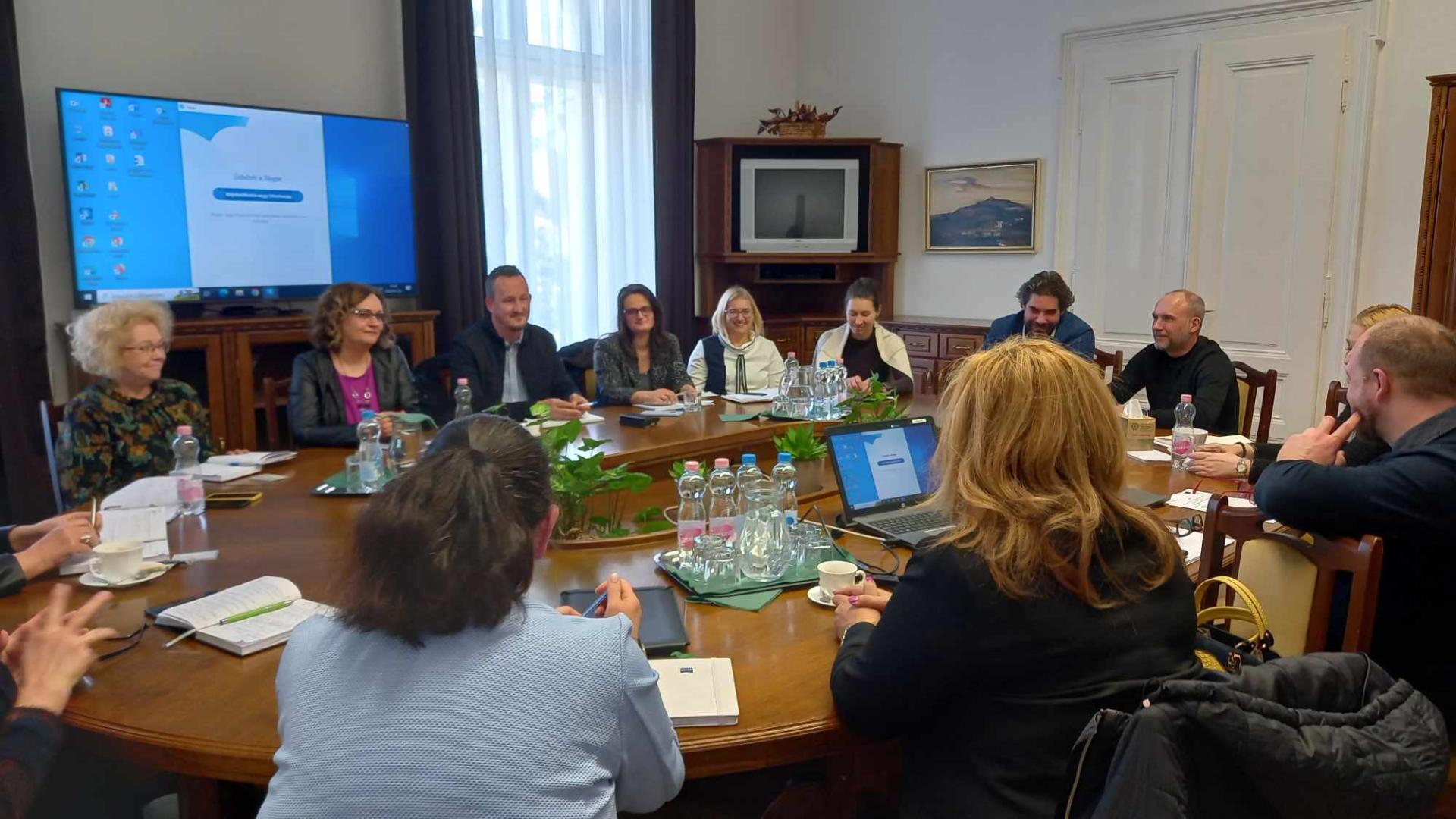
Based on the results, a so-called "well-being index" was developed based on quantifiable data: the individual's well-being index is shown on a 200-point scale through the subjective categories of health, economic factors, education, social relations, security and protection. This can be a generally applicable descriptive indicator that can help extend the results of the 4IM project to areas of the city with similar parameters.
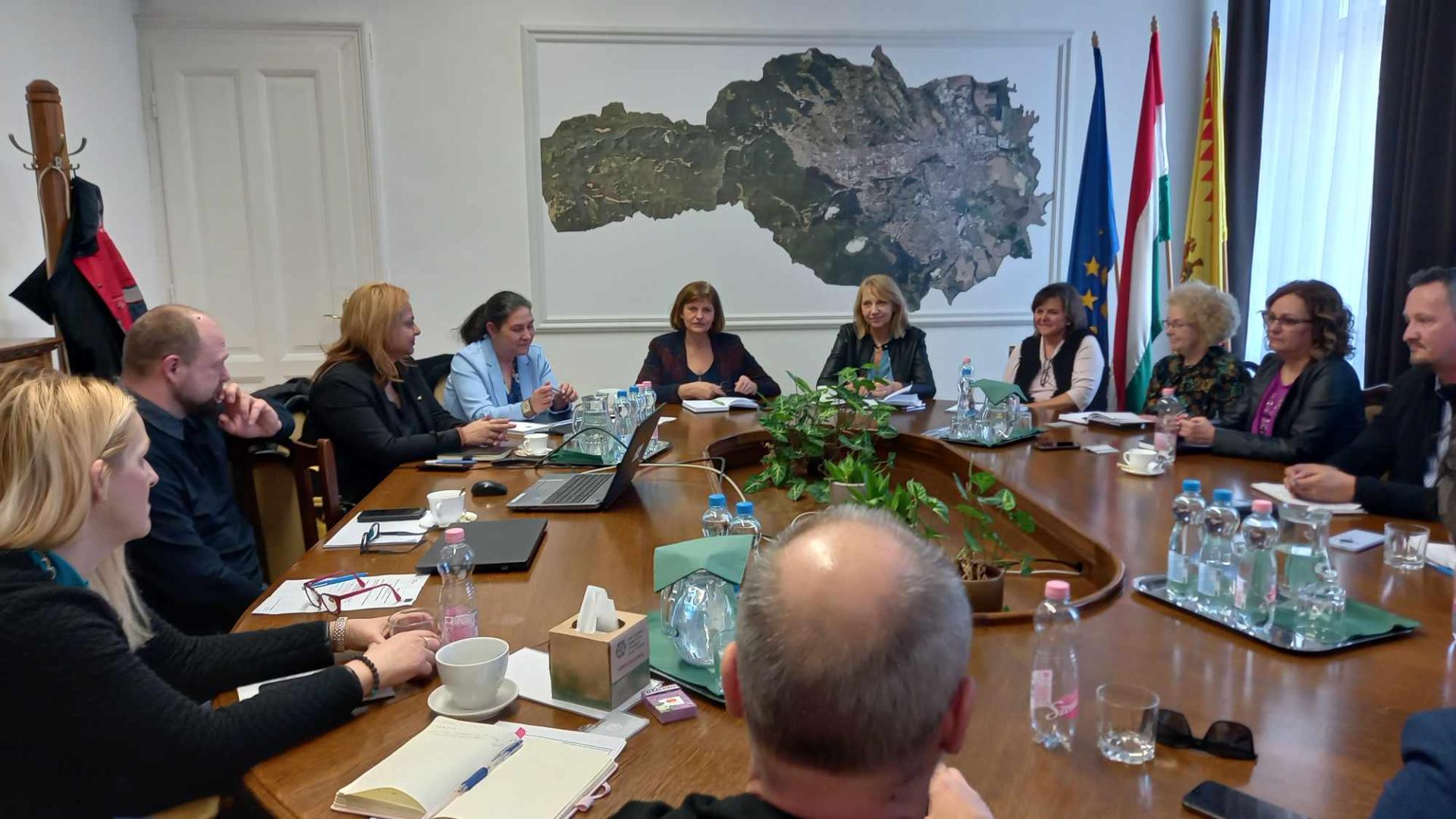
After the research presentation, the members of the Social Innovation Council agreed that the well-being indicator could be useful in the distribution of the social service packages of the city of Miskolc. At the same time, it was also determined that further research is necessary for progress.
They inspired job seekers through practical examples
The Social Innovation Resource Center organized a factory visit for a total of seven women from Tetemvár and Bábonyibérc. Residents of Miskolc interested in employment - thanks to the 4IM project - visited two "Tű, cérna, szeretet" sewing workshops of the Borsod-Abaúj-Zemplén County Organization of the Hungarian Red Cross. The program wanted to set a good practical example for job seekers.
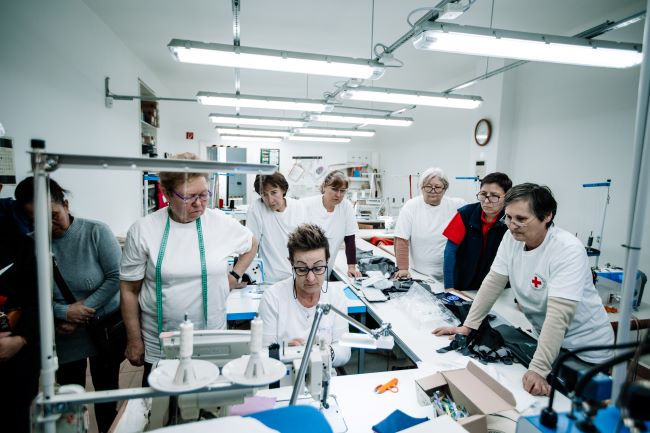
One of the basic professional goals of the 4IM project is to improve the living conditions of the residents of Miskolc living in the two districts that are to be developed through employment.
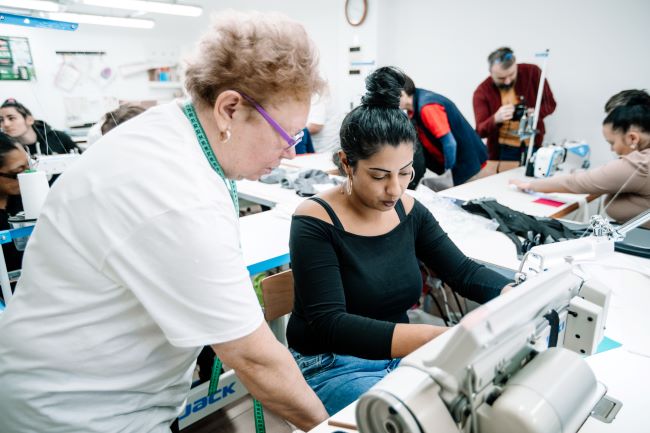
The Social Innovation Resource Center tries to achieve this through several means: between September and December 2023, community coaches and professional staff, in cooperation with partner organizations working in Bábonyibérc and Tetemvár, helped the labor market (re)integration of 49 residents of Miskolc with various methods. Among other things, by compiling a resume that meets the needs of the age, and with various trainings that help learn job searching techniques
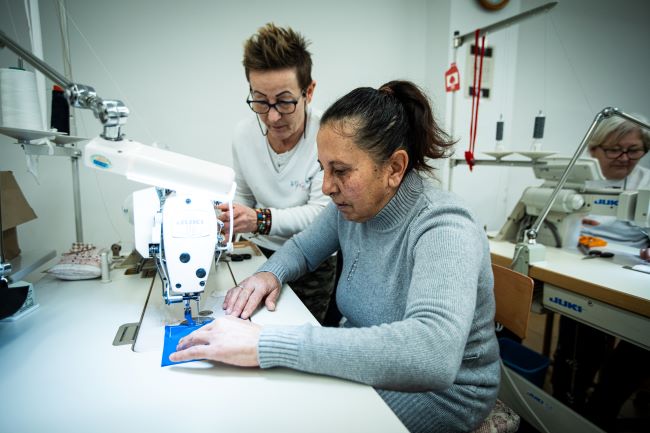
The professional staff of the Resource Center considers it important that, in addition to developing individual skills and abilities, the people of Miskolc living in Bábonyibérc and Tetemvár also meet good practical examples. In this spirit was, the January 26 visit to the two locations of the Hungarian Red Cross Borsod-Abaúj-Zemplén County Organization "Tű, cérna, szeretet" organized.
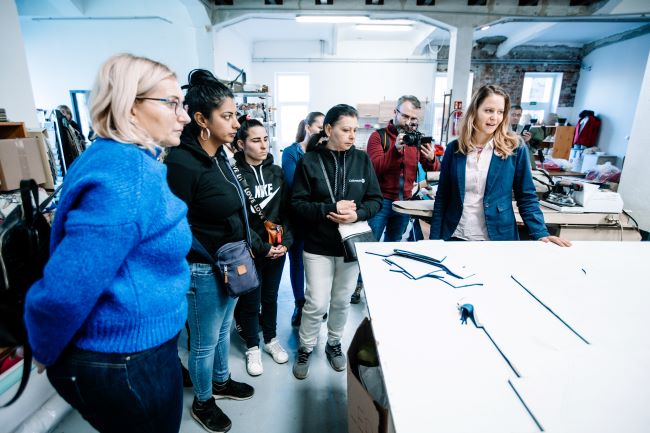
Women interested in employment gained work experience by getting to know the sewing work processes. They made an aroma pillow, which they then took home with them as a beautiful memory. One of them proudly remarked: "They won't even believe back home that I made this!".
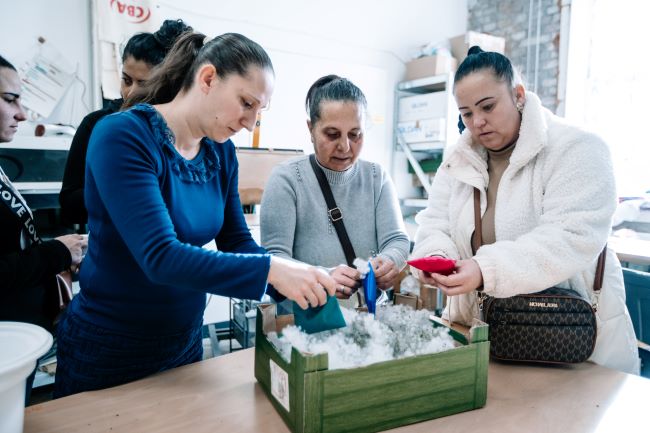
The staff of the Resource Center considered the visit so successful that they are already planning the next one.
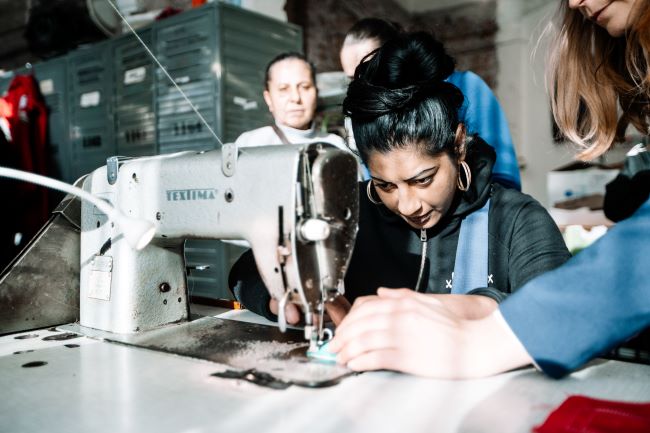
Islands of cooperation and hope in Miskolc
Poverty has been a long-standing problem in Miskolc, and experts agree that it affects an increasing proportion of the population. Rehabilitation of deprived neighbourhoods and the integration of their inhabitants into society is one way to combat it. The Central European city has won a grant from the European Union to develop potential solutions that focus on the integration and active participation of local population. Under the motto “Miskolc shall be a place for everyone”, the 4IM project aims to create opportunities for the development of underprivileged neighbourhoods and to help residents re-enter the labour market. The project focuses on two neighbourhoods: Tetemvár and Bábonyibérc, once thriving parts of the city that have since suffered from chronic poverty in the face of Miskolc’s steady deindustrialisation over the past decades. Through the project and the municipality’s efforts, these neighbourhoods have been turned these into tiny islands of hope for the city.
There are around 10,000 people living in the 16 districts of Miskolc in need of development, of which around 1,000 live in the areas selected for the “Miskolc shall be a place for everyone” project. The city’s rehabilitation plan provides an opportunity for residents of Tetemvár and Bábonyibérc to improve their living conditions via community engagement, outreach activities, improvement in the delivery and access to social services, and employment-promotion opportunities.
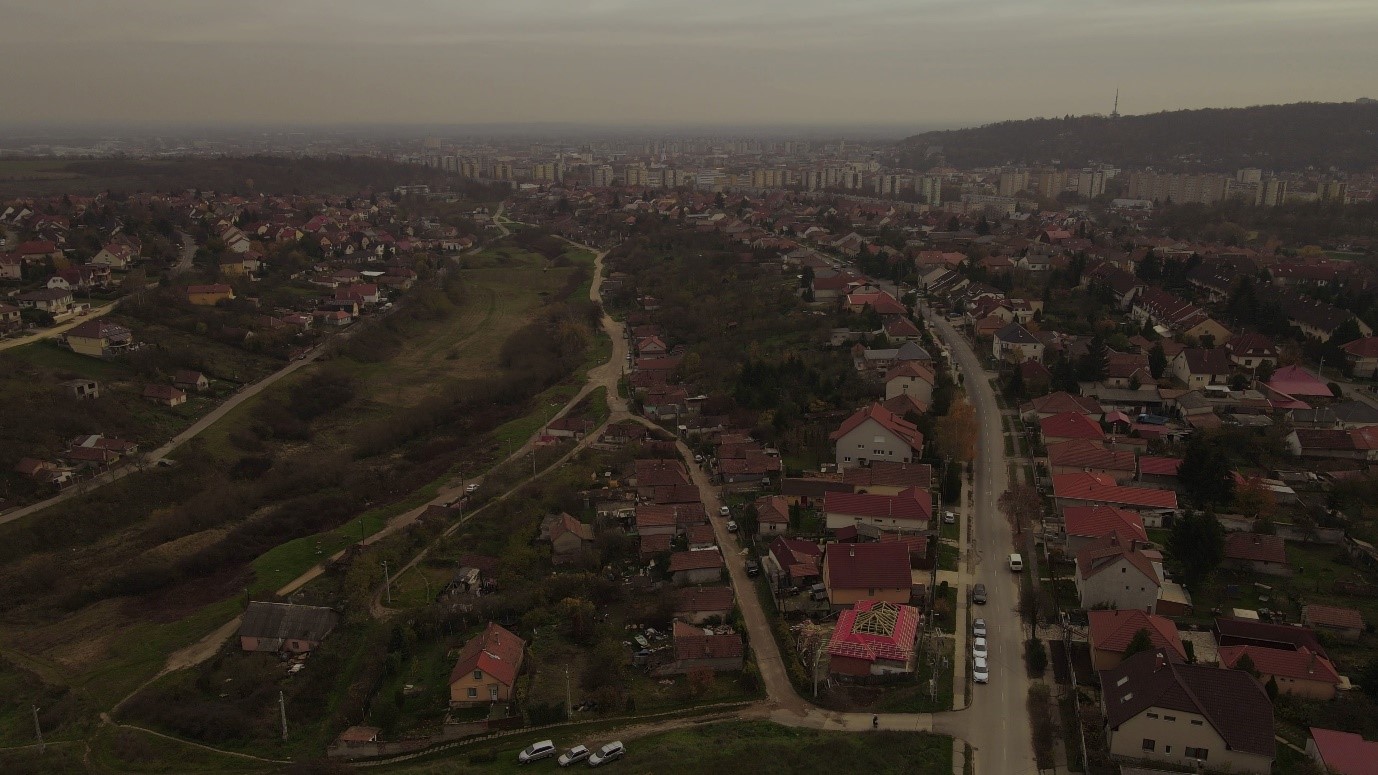
Tetemvár and Bábonyibérc
Miskolc was part of a network of wine-growing farming towns stretching from Gyöngyös to Tokaj-Hegyalja. These cities were once the most important links in the chain of settlements in the zone where the North Hungarian Mountains and the Great Plain meet.
Historically, Tetemvár and Bábonyibérc have figured among the 14 vineyards recorded in Miskolc. The former was the smallest nonetheless, its importance was manisfest shown by the fact that in the 18th century, the Greek Catholic bishop kept a wine-cellar there, among more than 300 others. Both districts were characterised by huts built next to the cellars by the locals which illegally offered food and drink and created a sort of rural slum. In the central valley of Bábonyibérc the Bábonyibérc-Újtelep housing project was established to house people in difficulty. After the First World War, most of its inhabitants – including refugees – lived in poorly-equipped, government-built huts that dotted the banks of the Pece stream.
Although the wine cellars of both areas played an important role in the social life of the citizens of Miskolc in the first half of the 20th century, the neighbourhoods became increasingly a hub for marginalised people.
Struggle out of hopelessness
“The difficulty with the development plans for these neighbourhoods is that no accurate official statistics for these parts of the city are available. Both districts have a predominantly disadvantaged or severely disadvantaged population. Additionally, there is constant movement in and out of the two neighbourhoods which makes working there exceptionally difficult” says Andrea Krank, head of the Resource Centre, an organisation set up by Miskolc to tackle the problem.
The people living in Tetemvár and Bábonyibérc have openly expressed that they feel worse off than those in other parts of the city: despite their proximity to the city centre residents have consistently had difficulty accessing basic public services – including health services, ambulances, etc. Paradoxically, they find it difficult to integrate into mainstream society despite their geographical proximity to the downtown area.
Few people participate in formal education and those that do frequently drop out before finishing. This has a profoundly adverse impact on their ability to access the job market as they lack not only the technical but also the social skills required to function in the workplace.
As part of the project, professionals will build contacts with local residents to assess the depth of the problems. One of the most pressing underlying issues in the two neighbourhoods is housing.
“Talking to the local population has shown that in nearly all households there is the desire to leave. Their life is made even more difficult by the fact that official ownership of most of the properties remains unclear, exacerbated by the very low market value of the houses. This makes many people’s dreams of creating better, safer and more secure housing for their families hard to realise, but we are here to try to keep that hope alive,” says Andrea Krank.
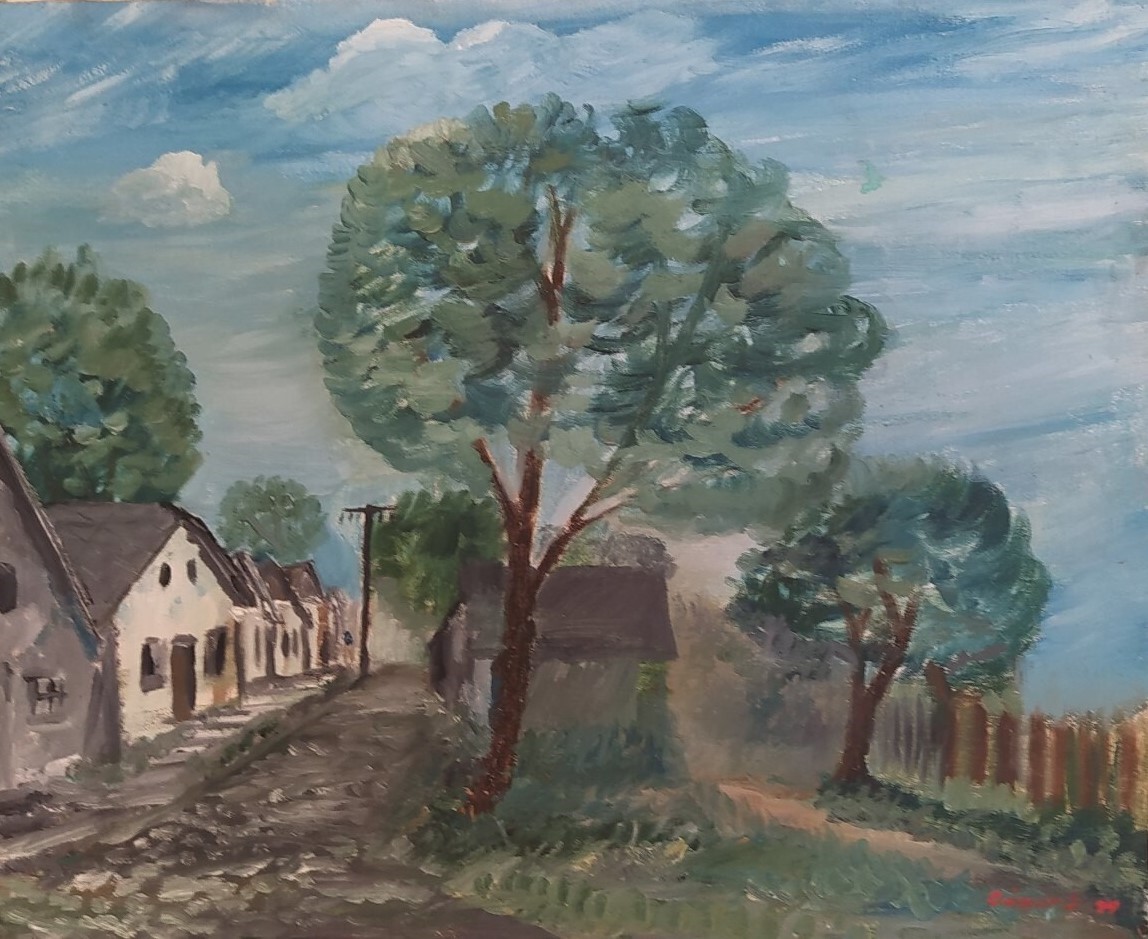
The centre of hope
In an initiative that is still a novelty in Hungary, a “Community Coach” has been invited to set up territorial working groups in both districts. These groups are made up of local residents, social workers, municipal representatives, a family support worker, a case manager, field workers and other NGO staff.
The Resource Centre, consisting of 11 professionals, coordinates the field work by targeting the key problems of the two neighbourhoods. One of the main objectives of the Centre is to build support, and maintain the motivation of local residents to encourage them to take action for themselves at community level. The Centre’s long-term mission is to improve the quality of life and increase employment-opportunities.
Krank concludes: “The Resource Centre has achieved promising initial successes in community-municipality cooperation. Trust and relationships with local people have been established whereby professionals have developed service packages tailored to the needs of the households. We work as a team to connect and coordinate the services of utility providers, municipalities and NGOs, so that professional assistance and problem-solving moves faster and becomes more efficient. Another recent success is the launch of employment counselling which has helped numerous local residents find jobs.”
Poverty is not just a question of money
Social innovation unique in Central Europe alive in Miskolc: an interview with the Deputy Mayor
No municipality in Hungary goes untouched by poverty. In 2021, the leadership of Miskolc chose to face the problems affecting the city via a social innovation plan based on the idea of “Miskolc shall be a place for everyone” an EU-financed project the city is currently implementing. Andrea Varga, Deputy Mayor of Miskolc, responsible for human services, on the special urban development effort, is featured in the below interview.
There are a number of development and social initiatives underway in numerous municipalities across Hungary. What is special or promising about the project you have started in Miskolc and what has the European Union seen in it as innovative?
If we want to have a livable and prosperous city, we have to do something about poverty. The 4IM project is a comprehensive and complex: it addresses old problems using new methods with a strong focus on developing new institutional capabilities. It does not follow a top-down “what to do” approach, but, in cooperation with those living on the periphery, it defines new directions for the development of social and employment services, and for linking and building on them, which we then plan to extend to the entire population of the city.
The 4IM project in Miskolc is one of the 69 pilot initiatives launched under the European Employment and Social Innovation (EaSI) programme as part of the European Social Fund. Nine of these received funding, of which Miskolc is the only municipality of Central Europe to be granted a project. Miskolc has thus become a member of a club where operational experience will be incorporated into the European Union’s policy guidelines and decisions. In other words, we are tasked with building an effective support system that promotes European-level objectives and can be used locally.
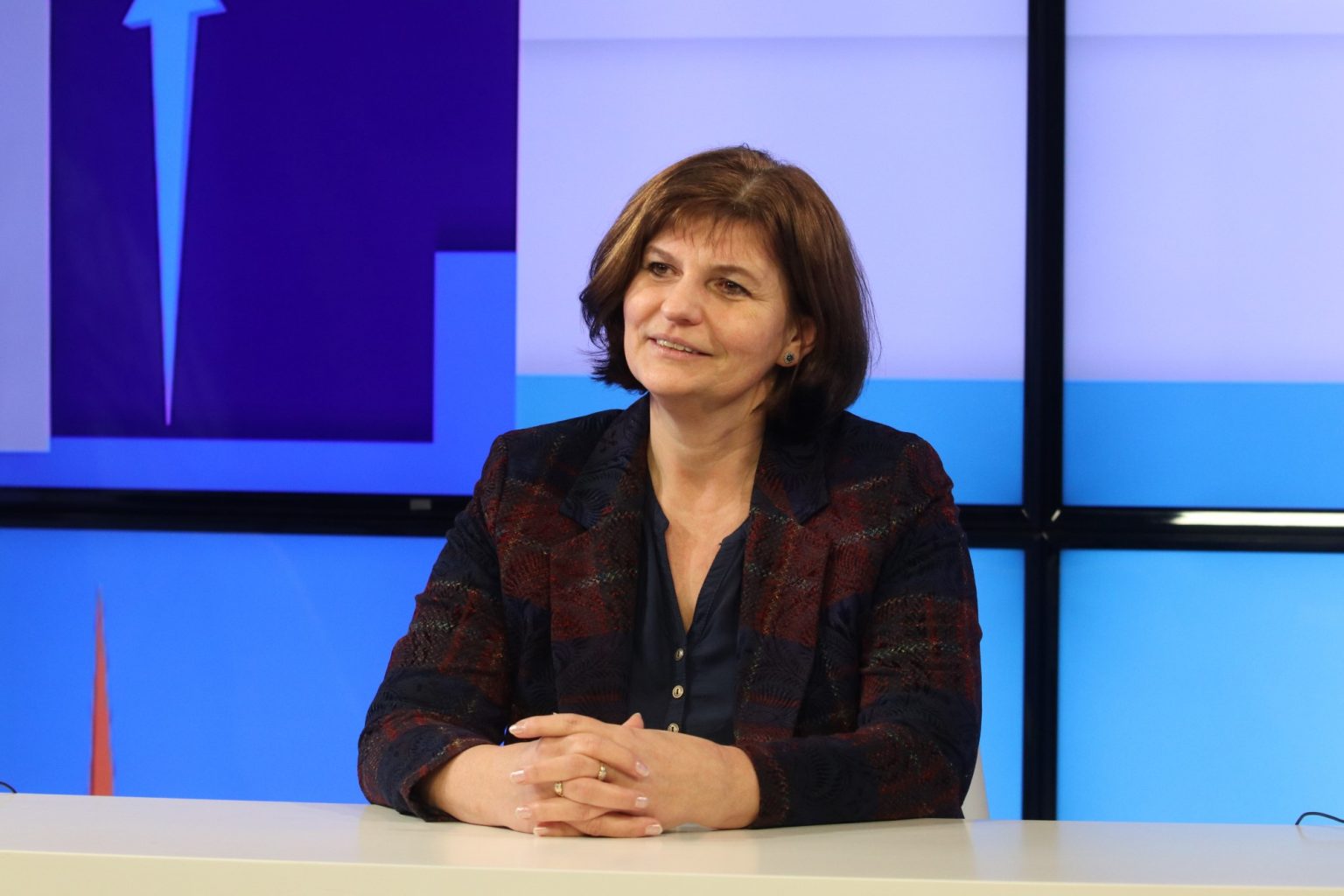
We will come to the old problems and new methods later, but first let us be clear: what is the significance of the project?
At stake is whether or not we have modern public services that live up to the reality of the city and are able to shape it. As a leader of the municipality, my job, together with the experts in the social and employment field, is to think systemically, just like managers of companies that settle here and offer jobs to Miskolc residents. We need to create public and social services that are responsive to the needs of the people; services that can help more of them become independent and autonomous citizens and active participants in the labour market.
Is it not what existing public social services have already been doing?
We have the same legal framework, public service methods, and institutional capacity that we had 20-30 years ago, while the world has changed and is still changing. You only have to think of how the coronavirus epidemic changed our lives and how its effects linger on, but there are also the old problems that our existing service systems could not solve, or could not do much about. Life changes, needs and challenges change, regulations and institutional frameworks need to be constantly reviewed and updated.
Let us start with the old problems.
The 2010 census of the Hungarian Central Statistical Office identified 33 below-average, catching-up neighbourhoods in Miskolc with a total population of around 5-6 thousand people. Based on the field work of the city’s social policy and social services professionals, we know that, remarkably, the number of these neighbourhoods has now fallen to 16. A big problem however is that their population has almost doubled, with around 10,000 people now living in these neighbourhoods. We therefore need to find professional and institutional ways to help marginalised people contribute to poverty reduction.
How can this problem be tackled?
We need to see that marginalised and underprivileged communities with complex problems receive via development professionals’ tailored methodologies social and employment services, innovations and interdependent solutions. These groups have fundamentally different experiences of living together, different norms that govern life, and a different sense of community participation in the municipality in which they live as compared to the majority of Miskolc’s residents.
What steps have you taken so far in the project and what have you achieved?
First, in 2019-20, we started a review of our social policy system to see how well it can respond to the challenges of 2021-22-23. Then we started field work to see the reality on the ground and assess the depth and breadth of the problems. For example, we made use of the community coaching toolbox, a methodology that is still new in Hungary.
Is this a new profession? What does the community coach do in Miskolc?
A community coach is a sort of guide who supports communities and organisations by first identifying and then assisting them in achieving their goals. They are a promoter of self-organisation and reorganisation of the local community. They support and mentor interested parties, and in particular those who want to play an active role. Community coaching is a development tool that encourages community members to act together according to their interests and to unleash the potential of individuals and the community to help them break out of extreme poverty. In the 4IM project, community coaches started their work in two of the 16 impoverished neighbourhoods: Tetemvár and Bábonyibérc. The aim of cooperating with them is to learn about local needs and, through dialogue, to learn more about the everyday lives of the people who live there, so as to develop a methodology adapted to their needs whereby social services may be better accessed.
What is the objective of the 4IM project?
It is an institutional development project, through which we can develop new service pathways that can support the people of Miskolc living in disadvantaged neighbourhoods. The goal is to improve their situation and better integrate them into the Miskolc community, including into the world of employment. In Miskolc, we are in uniquely difficult situation that we have a shortage of jobs and a shortage of labour. As Deputy Mayor, I believe that with an appropriate social and employment support system adapted to our social reality, the gap can be closed and companies coming to us will find more able and available labour.
Will there be other innovations in the project?
We are also exploring the possibility of introducing a minimum income scheme. Contrary to popular belief, poverty is not just about not having money, and money is not the only way out of poverty. Minimum income is a non-cash benefit, with the main function of ensuring access to adequate and basic public services, such as health care, childcare, energy, transport and digital communication services, for those who lack sufficient resources. Its function is to make up for what is lacking so that the persons concerned may live a life of dignity. Minimum income is not the same as unconditional basic income, as it is not unconditional. In addition to personalisation, an important part of the minimum income scheme is the cooperation of the person concerned with the designated social and employment services worker. No cooperation, no support. The social benefits are that professionals can learn more about the individuals concerned and identify additional circumstances, such as physical illness or mental blocks, that may have hindered the individual’s ability to work or enter the labour market and, through cooperation, may provide further personalised support to help them to enter the labour market.
How long is the project and what results have you achieved so far?
The project will run for 30 months between November 2021 and June 2024. It is different from any previous programme in that we are helping people in the two selected neighbourhoods understand that they can do something to improve their conditions and that nothing will change without their participation. So, we cooperated with them to set goals and implement small but important tasks together. One such project was the renovation of the staircase in Bábonyiérc. Locals reported that the shoes of children going to school and of adults going to work became muddy in rainy weather, which often led to conflicts and reinforced stereotypical attitudes towards them. Together with them, we renovated the staircase. With such small steps, we can improve human dignity and reduce everyday tensions.. There was also a community streambed clean-up undertaken by the people from nearby neighbourhoods: they joined forces when they realised that they had similar problems and that it was worth working together to do something about them. There have also been children’s meetings with local schoolchildren, which have led to games, theatre visits, gardening activities, and foreign language learning.
What will be done with the lessons learned and experience gained from the project?
We are constantly collecting and evaluating lessons learned. The Social Innovation Council was set up by the Mayor to make concrete proposals to the municipality on what social policy changes are needed. The project also has a geographically more distant impact. With a very similar social and economic present and recent past to Miskolc, the twin city of Košice also plans to use our experience to address its own challenges. We have also given signals to the government on what legislative changes we think are needed at national level.
Kassa is learning the methodology of community coaching from Miskolc
The transfer of the methodology of the 4IM project and the experiences of community coaching in Miskolc between the Hungarian and Slovak cities began at an online professional meeting. The Kassa partners will evaluate the information, and the parties will soon define the next steps of the exchange of experiences.
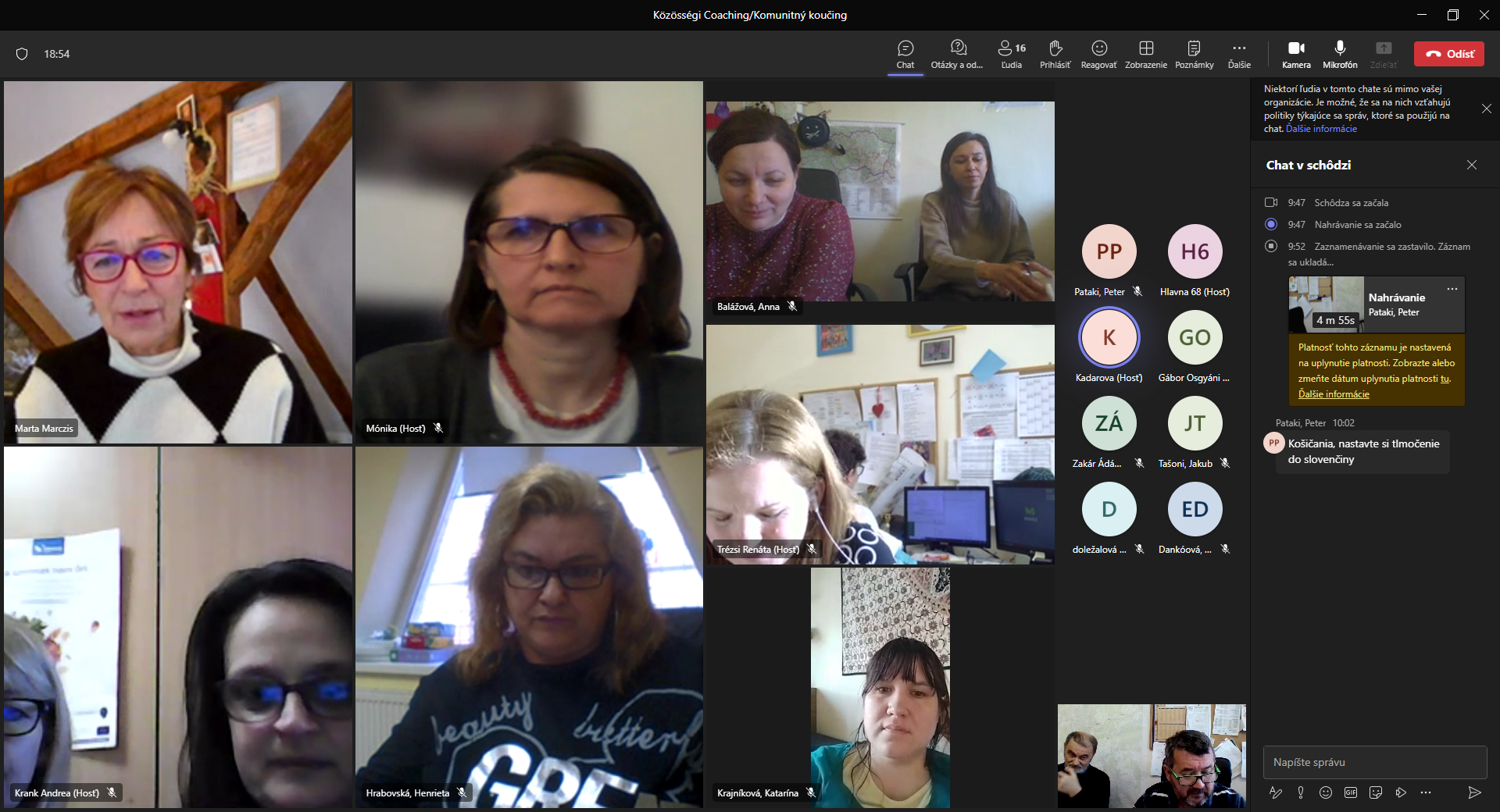
January 16th was the first occasion of the knowledge transfer, which specifically focused on the methodology of community coaching. As part of the 4IM project, Miskolc and Kassa have cooperated so far, but now the leaders of the latter city's social organizations were able to learn about the innovative method based on the experiences of Miskolc.
During the online consultation, Márta Márczis, the professional leader of the 4IM project, presented the community coaching methodology, while the participants from Kassa introduced themselves and talked about their own relevant projects.
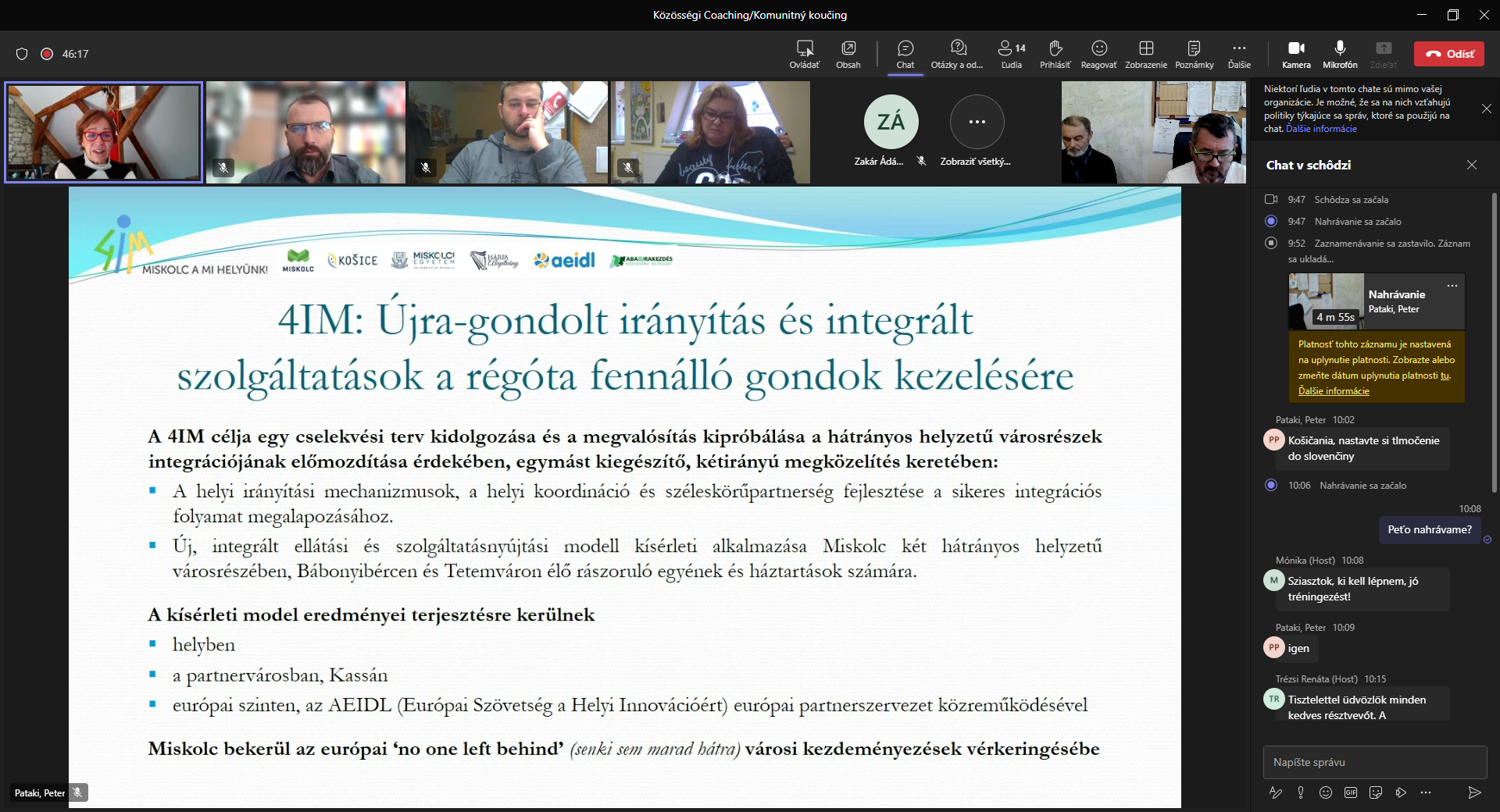
At the end of the virtual meeting, the parties agreed that in the coming period, the professionals of Kassa will examine how community coaching can be applied in their own areas. After that, it is conceivable that the transfer of knowledge will continue with training opportunities.